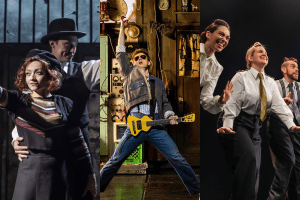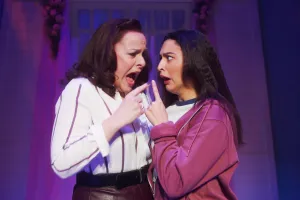20 Questions With…Thelma Holt
Producer Thelma Holt, the driving force behind the West End transfer of the RSC’s newly extended Jacobean season, talks about international love affairs, a fear of mediocrity & why British audiences are the best.
An acting contemporary of Judi Dench, Vanessa Redgrave and Maggie Smith, the inimitable Thelma Holt has become one of theatreland’s most important producers, with a particular passion for international work, Shakespeare and the classics.
In the early 1970s, Holt ran the groundbreaking Open Space theatre, which she co-founded with Charles Marowitz. Later that decade, she became artistic director of Camden’s The Roundhouse which she ran six years during its theatrical heyday and then, in 1985, went on to the National Theatre where she was head of touring and also the driving force behind a renowned International Season, which earned her a 1987 Laurence Olivier award for Outstanding Achievement.
In 1990, Holt founded her own company, Thelma Holt Ltd, which has mounted numerous high-profile productions and co-productions, including: Three Sisters with Vanessa, Lynn and Jemma Redgrave; Tango at the End of Winter and Hamlet with Alan Rickman; Electra with Fiona Shaw; Much Ado About Nothing with Mark Rylance and Janet McTeer; The Clandestine Marriage directed by and starring Nigel Hawthorne, A Doll’s House with McTeer; the West End transfer of Sam Mendes’ production of The Glass Menagerie with Zoe Wanamaker; Macbeth with Rufus Sewell; King Lear with Hawthorne; Miss Julie with Christopher Eccleston; Noel Coward’s Semi-Monde; David Hare’s Via Dolorosa; The Tempest starring Richard Briers.
Amongst her various theatre-related appointments, Holt acts as: Chairman of the Arts Council’s Drama Panel; a Council member at the Royal Academy of Dramatic Art (RADA); Patron of the Oxford University Dramatic Society, responsible for an annual overseas tour; an international producer at the Royal National Theatre; a director of the Almeida Theatre; a director of the National Youth Music Theatre; and chairman of Guildford’s Yvonne Arnaud Theatre. In 1994, she was awarded a CBE in the Queen’s Birthday Honours List.
Currently in the West End care of Holt, and co-producer Bill Kenwright, is the Royal Shakespeare Company’s season of five rarely performed Jacobean and Elizabethan plays, which was a critical hit last year in Stratford. The season – comprising Edward III, Eastward Ho!, The Roman Actor, The Island Princess and The Malconent – opened on 5 December 2002 at the Gielgud Theatre, where its now extended booking by two months to 22 March 2003.
Place of birth
Born in Barton on Irwell, Lancashire.
Lives now in…
Notting Hill Gate in west London.
Training
Royal Academy of Dramatic Art.
First big break
I’m incredibly lucky by nature. When I left RADA, I got an acting contract with HM Tennent – the biggest theatrical management of the day, under Binkie Beaumont – so I stepped straight into work and, in the 1950s, that was very rare. You have to remember, London was very different then. We paid heavily for the war and were still recovering. In 1958, the Queen’s Theatre was still bombed out. The plays we did then were non-confrontational, extremely anodyne and escapist, the art was still enormously affected by the war and its aftermath. We toured for a few weeks and then came into London, to the Globe, which is now the Gielgud. That’s where I am again now with the RSC season so it’s like coming full circle. Of course, I’ve been there many times over the years, but I never thought I’d be standing on that stage with five different directors and five different designers and no one quarrelling.
Meeting the Russians in 1962 was a tremendous turning point for me – that’s what first began my passion for world theatre. At RADA, we never did Ibsen or Chekhov, though we were stuffed like turkey with Shaw and Shakespeare. By 1967, I knew I wanted to build my own theatre and I did so with my partner Charles Marowitz. For eight years at the Open Space, I played the roles I wanted to play. People were always very kind about me as an actress, but I came from a generation with a cornucopia of talent – Maggie, Vanessa and Judi – and I knew I was not in their league. I sat with them in the dressing rooms and heard them whingeing about producers. I thought I could do it better and I still think I do it better.
After Marowitz and I parted company, the Space closed and I went to the Roundhouse where I was able to indulge my passion for international work. It would be easier to tell you what we didn’t do there than what we did do. To keep going financially, we held rock concerts on Sundays. It was a real ‘happening’. After that, I had a year in the West End with Ray Cooney and learnt what a world without subsidy was like and then I went to the National.
Career highlights to date
I was at RADA with Joe Orton and waited 18 years to do Loot, which I put on in the West End with Leonard Rossiter in 1983. That was the definitive production. I haven’t been able to see the play since. I loved Len so much. It was terrible when he died on us (the actor passed away in the dressing room during a performance) – it was like I had my lollipop taken away.
At the National (in the late 1980s), Peter Hall said to me “Why don’t you do an international season?” I had already been handling tours for them. I said “Who’s in charge?” And he said, “You are, Thelma.” He gave me little bits of advice along the way, but he let me do it and I am eternally grateful to him for that. There were two productions that stand out from that season for me. Peter Stein’s The Hairy Ape was a tremendous technical achievement; a vast, magnificent success that has gone down in theatre history. And secondly, Yukio Ninagawa‘s Macbeth, which is the most moving I have ever seen.
What do awards mean to you?
The Tynan Award meant a lot to me because I knew (the late theatre critic) Kenneth Tynan. In fact, I got one of the worst reviews of my life from him, but I still had great respect for him. In any case, awards are not yours, you share them with everyone involved in a show. Recognition from one’s industry is what’s most important.
Favourite productions you’ve ever worked on
There are so many I couldn’t count them on both hands, feet and knees. A Doll’s House (with Janet McTeer) was very special. That won four Tonys when it went to Broadway. And Much Ado About Nothing (with McTeer and Mark Rylance, directed by Matthew Warchus). Mark and Matthew won something for that but I can’t remember what. That was the first time Much Ado had been on the Avenue in 52 years. We were at the Queen’s with all those wonderful ghosts.
Favourite directors
Yukio Ninagawa, of course. I shouldn’t really speak of him because I can only see him through rose-tinted glasses. We are now into our 15th year of working together, and I’ve so far brought him to the UK 13 times. I’ve very proud of that. And I love the Japanese. They don’t have a word for ‘no’.
I don’t always expect so much of directors and other members of the creative team. They are only there to serve – the actors are there to do. I expect much more of actors, I suppose, because I was an actress. An actor’s life is a funny life. The best actors I know have never really grown up – it’s bad to grow up. I have a great weakness for actors, but I’m addicted to talent in general. I always have been. That brings with it some bad things. I’m very intolerant and I’m afraid of mediocrity. It scares me and I don’t want it around me. Unfortunately, there’s a lot of it in this country.
Favourite actors
I’m a bit of a tart in that it’s always the ones I’m working with currently. Nigel Hawthorne was a very dear friend for 40 years; we were having our anniversary when he died. Ours was a very special and important relationship because we lived through so much together. His partner Trevor is still there for me. I’ve had wonderful experiences with Vanessa Redgrave, and I love Alan Rickman. He’s a fine actor and, though he’d hate me for saying it, he’s a very soft touch, particularly in terms of supporting the profession. We’re on the Council at RADA together.
Favourite playwrights
Apart from Shakespeare – who’s very contemporary as far as I’m concerned – my favourites are Stoppard, Hare, Pinter, Chekhov, O’Neill and Ibsen.
How do you decide whether or not to produce a play?
It’s very easy. If it’s foreign, I go to see it and I know within the first ten minutes whether I want to take it on. With my own work, what happens is an actor or director comes to me with an idea. We sit down, have a meal and explore it. Or sometimes I have my own idea in the middle of the night. Things happen that way.
You’ve produced so much abroad as well as in the UK. How, if at all, do you think audiences differ in other countries?
They vary tremendously, but British audiences are the best in the world. Until very recently, I was against simultaneous translations with surtitles in international productions. I don’t think most people can be asked to work that hard. But British audiences can, they make the effort, they are prepared to come and be challenged. There’s a lot of talk about dwindling audiences here and, it’s true, that is a concern, but we should take heart in the fact that those who do go to the theatre in this country are truly committed and passionate. That’s wonderful. American audiences can be very inconsiderate. With my first production in the US, Dustin Hoffman in The Merchant of Venice, I found it incredible that people who bought a seat seemed to think they’d bought the run of the theatre. They would come in very late and not be bothered about the disruption they caused. The Japanese behave magnificently. They’re small anyway and very aware of not drawing attention to themselves.
How do you think the West End has changed during your career?
It’s more expensive and it’s not easy to get into the West End. The middle-aged, middle class audience from out of town – which is the mainstay of the West End – must find it horrendous. So there’s an economic problem, but I don’t subscribe to this thing about the dumbing down of the work. Theatre is a moveable feast and changing all the time. One week, I can walk down the Avenue and see a procession of shit and a week later, I can walk down and notice something that really appeals to someone like me. However, the best playwrights and actors are increasingly drawn to places like the Almeida, the Donmar and the National, with their wonderful facilities and reputations, rather than to the commercial West End.
What’s the last thing you saw on stage that you really enjoyed?
My own production of The Tempest with Richard Briers. And I really loved Via Dolorosa. David (Hare) was great, such a generous performance and very brave. When he visited the Middle East, he came home with a lot of humility and a big hole in his heart, which comes through in the show. When I hate a work, it’s because I got it wrong. I have to do The Scottish Play again at some point.
What advice would you give to the government to secure & maintain the future of British theatre?
Take the advice – whether palatable or not – of the people who actually do it. Sometimes I think the problem is they don’t know where to look for that kind of advice. What they get instead is what in Yorkshire is called ‘warm’ – tell-you-what-you-want-to-hear advice, which is no good.
If you could swap places with one person (living or dead), who would it be?
Queen Elizabeth I on the day of the defeat of the Spanish Armada in 1588.
Favourite books
Thomas More’s Utopia and a book of sonnets that I read before I go to sleep.
Favourite holiday destinations
I spent a brief time at school in Switzerland and I like going back there. I don’t ski anymore – I used to love skiing off-piste. Also, Japan.
Favourite after-show haunts
The Ivy, of course. I don’t go anywhere else.
If you hadn’t become involved with theatre, what would you have done as a profession?
There would be no life without theatre. Until the age of eight when it occurred to me being a woman was a problem, I wished I could be a Catholic priest. But after that, it was always theatre. I can’t envisage anything else and I think anyone who can should not be doing it.
What drew you to the Jacobean season of plays?
I was not drawn to it, I was railroaded into it by Gregory Doran. I thought it was too heavy in terms of personnel, but I made the fatal mistake of going down to Stratford and seeing them. It feels like going backwards in some ways – like the best of the RSC when I was young, so exciting. I feel very strongly about the RSC. It’s had a hard time recently, but the fact is, it is part of our country’s inheritance. Those who work there now are just the keepers. So one morning I went to see them and Greg had gathered all the actors from all five plays together. There’s a smell about an ensemble when they know they’re good – this ensemble is very good and they were determined to come in.
I think Jacobean plays are almost more contemporary at the moment than Shakespeare. Sleaze, conspiracy, monsters – they’re all there. And the Jacobeans didn’t last very long, they got their comeuppance in the end, and maybe that’s telling. It’s like karmic backlash.
Do you have a favourite among the five plays?
Whichever I’m seeing on the night. They each have a different resonance for me and I keep changing my views. When I first saw Edward III years ago, I was absolutely convinced Shakespeare hadn’t written it. There was no scientific reason for this, it was just something I felt. But when I saw it again as part of this season, I changed my mind. Each of the plays has its strengths and I love the idea that they are a package. There’s a crown and these individual jewels in it. And they are all precious and must be looked after. It would not have worked to bring only one or two in.
Do you think it’s a good idea to run commercial productions in repertory? Would you like to see a return to more rep companies?
I would like to see more repertory in the West End because that’s how you’re able to appreciate the tremendous variety of a company. It’s great to watch an actor in a small role in one play, then a big role in the next. I probably wouldn’t advise doing five at once, though. It’s never been done like this before and Bill (Kenwright – Holt’s co-producer, who has put up the funds for the West End season) is going to lose an awful lot of money. It’s lunacy.
Should the company have a permanent West End home or involve more commercial producers like yourself on London projects?
The RSC should have a permanent London home and be doing this for themselves. I don’t plan to be taking on any more RSC productions. I’m fully occupied until the end of next year, by which time they should be much further ahead with their own plans. They need the money to set up properly in London and help in showing how to produce properly here. I found the Roundhouse season very distressing. Those awful red seats and the attempt at gentrifying a venue with ley lines to Glastonbury! They shouldn’t have stayed at the Barbican, but they shouldn’t have left before they had somewhere else to go to either. If I could wave a magic wand, I’d put them back in a permanent home, with money to finance it and the good sense to use the expertise they require.
What are your plans for the future?
I’m working on three new shows for 2003: Ninagawa’s Japanese production of Pericles, at the National in March; Ingmar Bergman’s Swedish production of Ghosts, at the Barbican in May; and later on, Jonathan Kent‘s new production of Hamlet at Sadler’s Wells. In 2004, I’m co-producing Ninagawa’s new English-language production of Hamletwith Theatre Royal Plymouth and another Shakespeare – which is still to be confirmed. Ninagawa and I are also exploring putting on some of Yukio Mishima’s plays, but with English actors. And in 2005, I’m trying to finally nail Simon Callow to the mast, either acting or directing.
– Thelma Holt was speaking to Terri Paddock
The “Jacobethan” repertoire has extended its season at the West End’s Gielgud Theatre by two months and is now booking to 22 March 2003.












